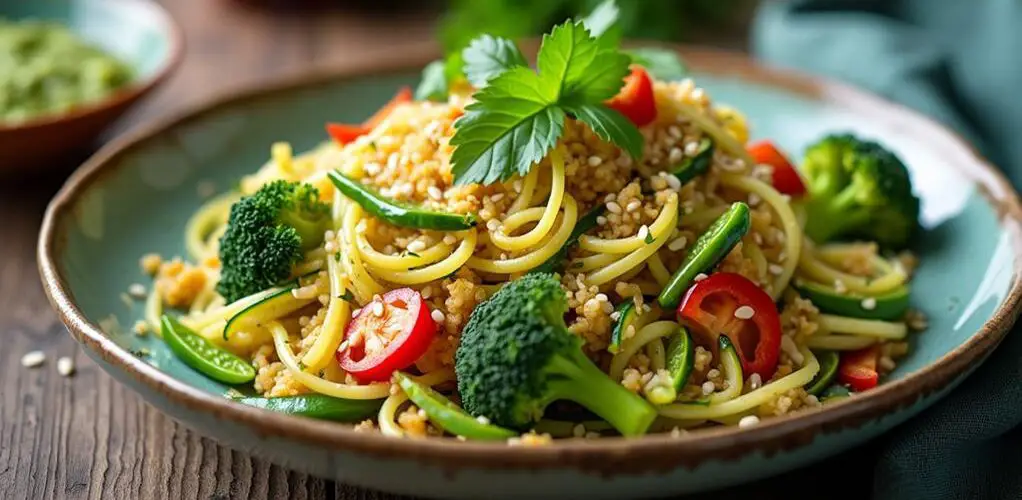
To maintain ketosis on a keto diet, avoid refined carbohydrates such as white bread and pasta, which spike blood sugar and disrupt ketosis. Steer clear of sugary beverages and alcoholic drinks like beer and cocktails, which are high in carbs. Sugars and sweetened foods, including honey, maple syrup, and flavored yogurts, should also be avoided. High-sugar fruits like bananas and fruit juices, along with starchy vegetables such as potatoes and corn, can impede your ketogenic progress. By avoiding these foods, you help guarantee your body stays in a ketogenic state, promoting effective weight management and metabolic health. Discover more keto essentials ahead.
Key Takeaways
- Avoid refined carbohydrates like white bread and pasta to maintain ketosis.
- Skip high-carb alcoholic beverages like beer and cocktails; opt for hard liquors with unsweetened mixers.
- Eliminate sugars and sweetened foods such as honey and sugary sodas.
- Limit high-sugar fruits and fruit juices, including bananas and orange juice.
- Exclude starchy vegetables like potatoes and corn to stay within low carb limits.
Refined Carbohydrates
Refined carbohydrates, such as white bread, pasta, and rice, pose a significant challenge to maintaining ketosis due to their high carbohydrate content. For instance, a single slice of white sandwich bread contains 13 grams of carbs, while one cup of cooked pasta contains 33 grams of carbs. These foods can cause significant spikes in blood sugar levels, disrupting the metabolic state of ketosis, where the body efficiently burns fat for fuel instead of carbohydrates.
In addition to refined carbs, starchy vegetables like potatoes and corn can also hinder ketosis due to their high carb content.
The heightened blood sugar levels from consuming refined carbs not only hinder ketosis but also lead to increased hunger and cravings. This makes it considerably difficult to adhere to a ketogenic diet. To mitigate these effects, it is essential to opt for low-carb alternatives. Substitutes like mashed cauliflower and almond flour bread can provide similar textures and flavors without the high carb content, helping to maintain stable blood sugar levels and support ketosis.
Furthermore, vigilance is necessary when selecting processed foods, as many snacks and ready-made meals contain hidden refined carbs. Reading labels thoroughly guarantees that you avoid these detrimental ingredients, facilitating a more effective and sustainable ketogenic diet.
Alcoholic Beverages
Alcoholic beverages can pose a significant challenge for individuals adhering to a ketogenic diet due to their variable carbohydrate content. Many popular alcoholic drinks, such as beer and mixed cocktails, are high in carbohydrates which can disrupt ketosis. For instance, a piña colada can contain around 32 grams of net carbs, making it an unsuitable choice for those on a keto diet.
Even light beers, which typically have about 6 grams of carbs per 12 ounces, should be consumed in moderation to avoid exceeding daily carb limits.
However, there are keto friendly cocktails that can be enjoyed. Hard liquors like vodka, gin, and whiskey generally contain minimal carbs when consumed neat or mixed with unsweetened soda water. It's important to be cautious of mixers that may contain hidden sugars, which can impact alcohol metabolism and interfere with ketosis.
Healthy fats from sources like avocados and nuts can also aid in maintaining ketosis when balanced with occasional alcohol consumption.
While research on the effects of alcohol during a ketogenic diet is limited, maintaining moderation is vital. Overconsumption of alcohol can impair judgment and lead to poor dietary choices, ultimately disrupting the delicate balance of ketosis.
As a result, those on a keto diet should choose their alcoholic beverages wisely and prioritize low-carb options.
Sugars and Sweeteners
Beyond the complexities posed by alcoholic beverages, sugars and sweeteners present another significant challenge for those adhering to a ketogenic diet.
Sugars, such as honey and maple syrup, are concentrated sources of carbohydrates, with honey containing 17g of carbs per tablespoon and maple syrup 13g per tablespoon. These sugars offer minimal nutritional benefits and can quickly disrupt ketosis.
Similarly, sugary sodas like Coca-Cola, with 39g of carbs per 12-ounce can, are detrimental. Sweetened yogurts, particularly flavored varieties, can contain up to 30g of carbs per serving, posing a significant risk to maintaining low carb limits.
Common condiments like ketchup and barbecue sauce often contain hidden sugars, with ketchup providing approximately 3g of carbs per packet and barbecue sauce around 4g per packet. These hidden sugars can accumulate quickly, making it difficult to stay within carb limits.
It's important to check labels for hidden sugars and carbs in sweeteners to avoid unintentional intake.
- Sugary sodas: 39g carbs per 12-ounce can.
- Sweetened yogurts: Up to 30g carbs per serving.
- Condiments: Hidden sugars in ketchup (3g per packet) and barbecue sauce (4g per packet).
For those on a keto diet, artificial sweeteners and sugar alcohols may serve as alternatives, but careful selection and moderation are essential to avoid unintentional carb intake.
Fruits and Juices
Fruits and Juices
While fruits are often celebrated for their nutritional benefits, many are high in sugar and carbohydrates, making them less suitable for a ketogenic diet. For instance, a medium banana contains approximately 27g of carbs, and a cup of grapes has around 26g of carbs, both of which can quickly exceed the daily carb limit on a keto regimen.
Fruit juices pose an even greater challenge as they are low in fiber and high in natural sugars. An 8-ounce serving of orange juice, for example, contains about 26g of carbs, making it difficult to stay within keto guidelines. Dried fruits are particularly problematic due to their concentrated sugar content. A single Medjool date contains around 18g of carbs, which can notably impact ketosis.
While whole fruits can be consumed in moderation, it is advisable to opt for low carb alternatives like fresh berries. For example, 1/2 cup of raspberries has only 3g of net carbs, making them a more suitable choice.
Portion control is essential when consuming fruits on a keto diet. Even lower-carb fruits can contribute to exceeding the daily carb limit if not monitored carefully, therefore hindering the effectiveness of the diet.
Starchy Vegetables
Maneuvering the landscape of a ketogenic diet requires a keen understanding of carbohydrate sources, and starchy vegetables represent a significant category to be cautious about.
Potatoes, for instance, contain up to 37g of carbohydrates per medium potato, making them a substantial carb source unsuitable for those aiming to maintain ketosis. Similarly, sweet potatoes, with around 20g of carbohydrates per medium potato, exceed the carb limits for a keto diet. Corn, another high-carb vegetable, offers approximately 27g of carbohydrates per cup, thereby necessitating limitation in a ketogenic regimen.
Additionally, green peas are another type of starchy vegetable that contains around 20.9 grams of carbs per cup, which can disrupt ketosis if consumed in large quantities.
To adhere to keto guidelines, it is advisable to focus on non-starchy, low-carb options such as broccoli and spinach, which generally contain under 8g of net carbs per cup. These alternatives allow for greater dietary flexibility while maintaining the low-carb intake essential for ketosis.
Consider the following practical advice when maneuvering through starchy vegetables on a keto diet:
- Potato alternatives: Opt for cauliflower mash instead of mashed potatoes.
- Low carb options: Choose zucchini noodles over traditional pasta.
- Mindful substitutions: Use radishes in stews instead of higher-carb root vegetables like carrots.
Frequently Asked Questions
What Foods Can You Not Eat on Keto?
On a keto diet, avoid high-carb fruits, grains, starchy vegetables, legumes, and sugary foods, including those with hidden sugars. Opt for keto snacks low in carbohydrates to maintain ketosis and support metabolic health.
What Are the 9 Rules of Keto?
The nine rules of keto involve limiting carbohydrates, maintaining moderate protein intake, prioritizing healthy fats, staying hydrated, incorporating low-carb vegetables, monitoring electrolytes, planning meals, exploring keto snack ideas, and tracking progress for sustained ketosis.
What Are the Top 10 Keto Foods?
The top 10 keto foods include fatty fish, low-carb vegetables, cheese, nuts, seeds, healthy oils, avocados, eggs, meats, and keto-friendly snacks. These options provide essential nutrients while maintaining ketosis, promoting overall health and energy balance.
What Foods Kick You From Ketosis?
Foods that can kick you from ketosis include high-carb fruits, starchy vegetables, grains, sugary products, and processed foods. These items contribute to sugar spikes and carbohydrate overload, disrupting the metabolic state required for ketosis.
Conclusion
Adhering to a ketogenic diet necessitates the careful avoidance of refined carbohydrates, alcoholic beverages, sugars and sweeteners, fruits and juices, and starchy vegetables. These foods can greatly disrupt ketosis by increasing blood glucose levels and insulin response, thereby hindering the metabolic state essential for a ketogenic diet's effectiveness. For best outcomes, it is imperative to select low-carbohydrate, high-fat alternatives that align with ketogenic dietary principles.
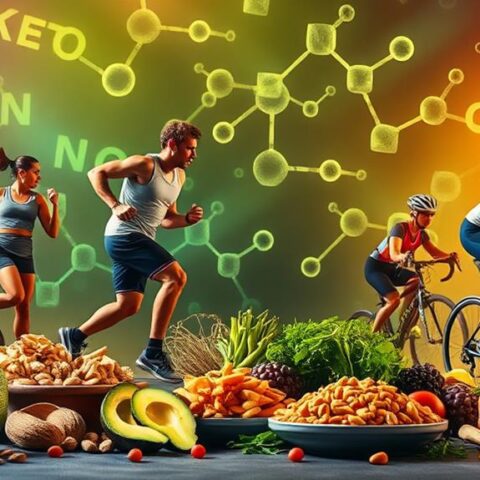

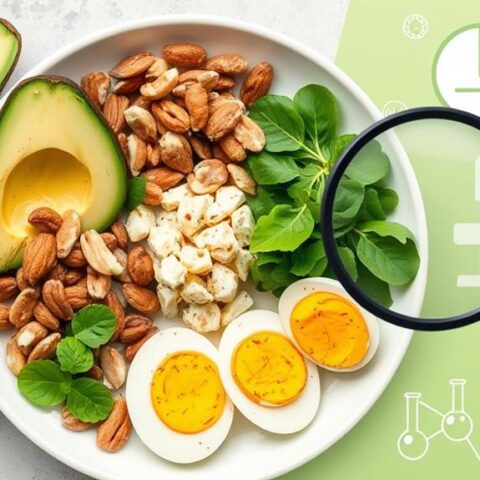
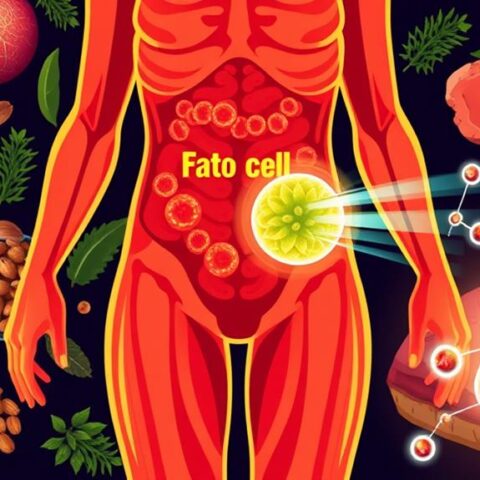
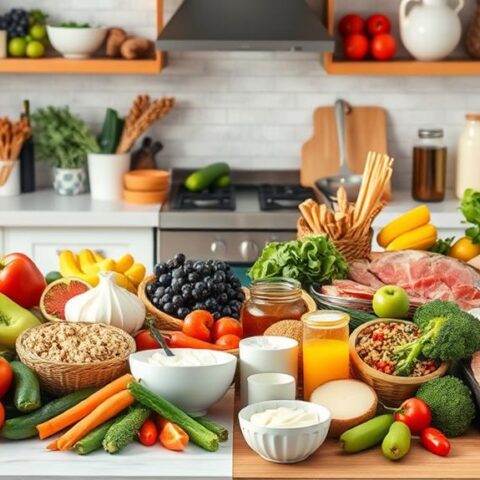




No Comments